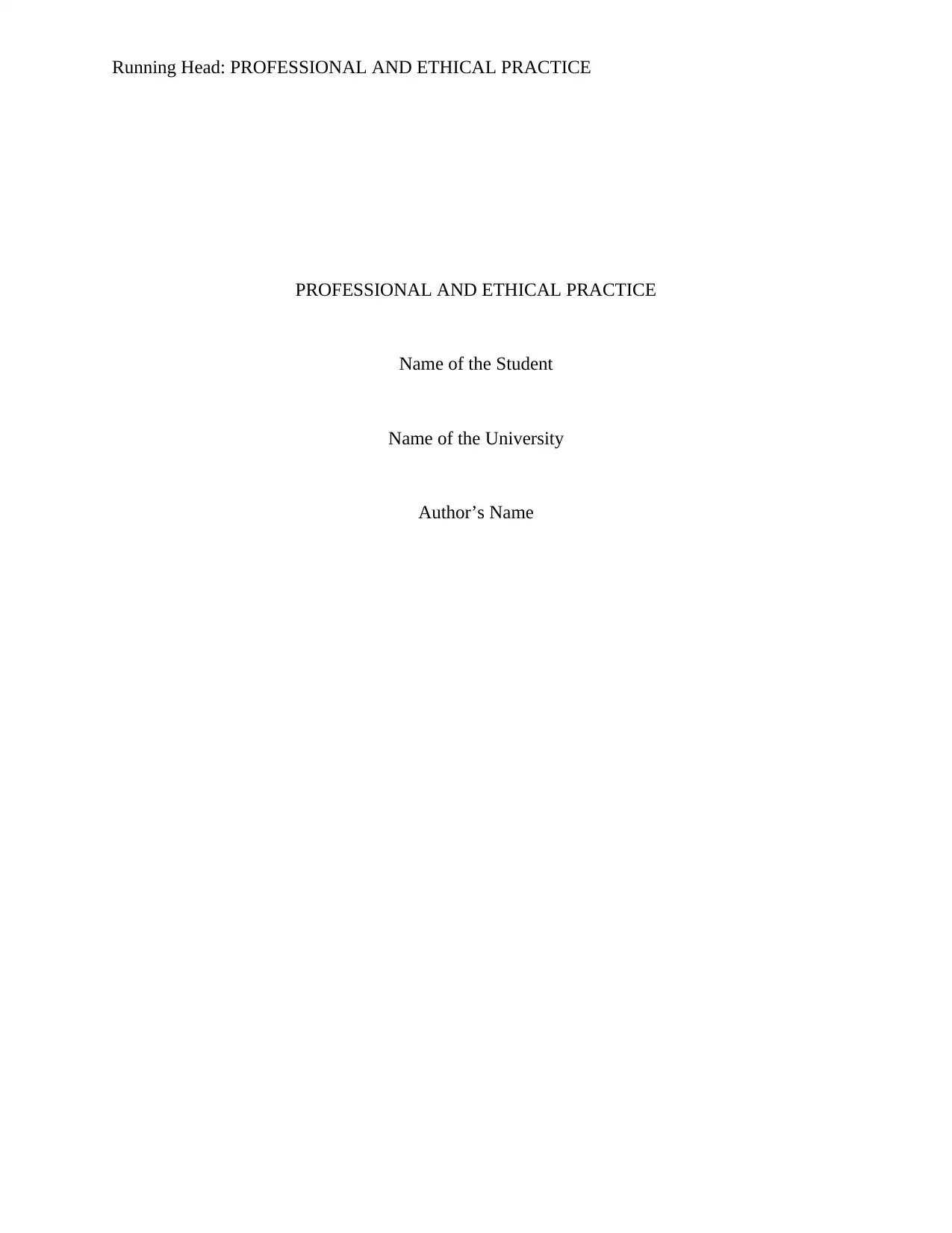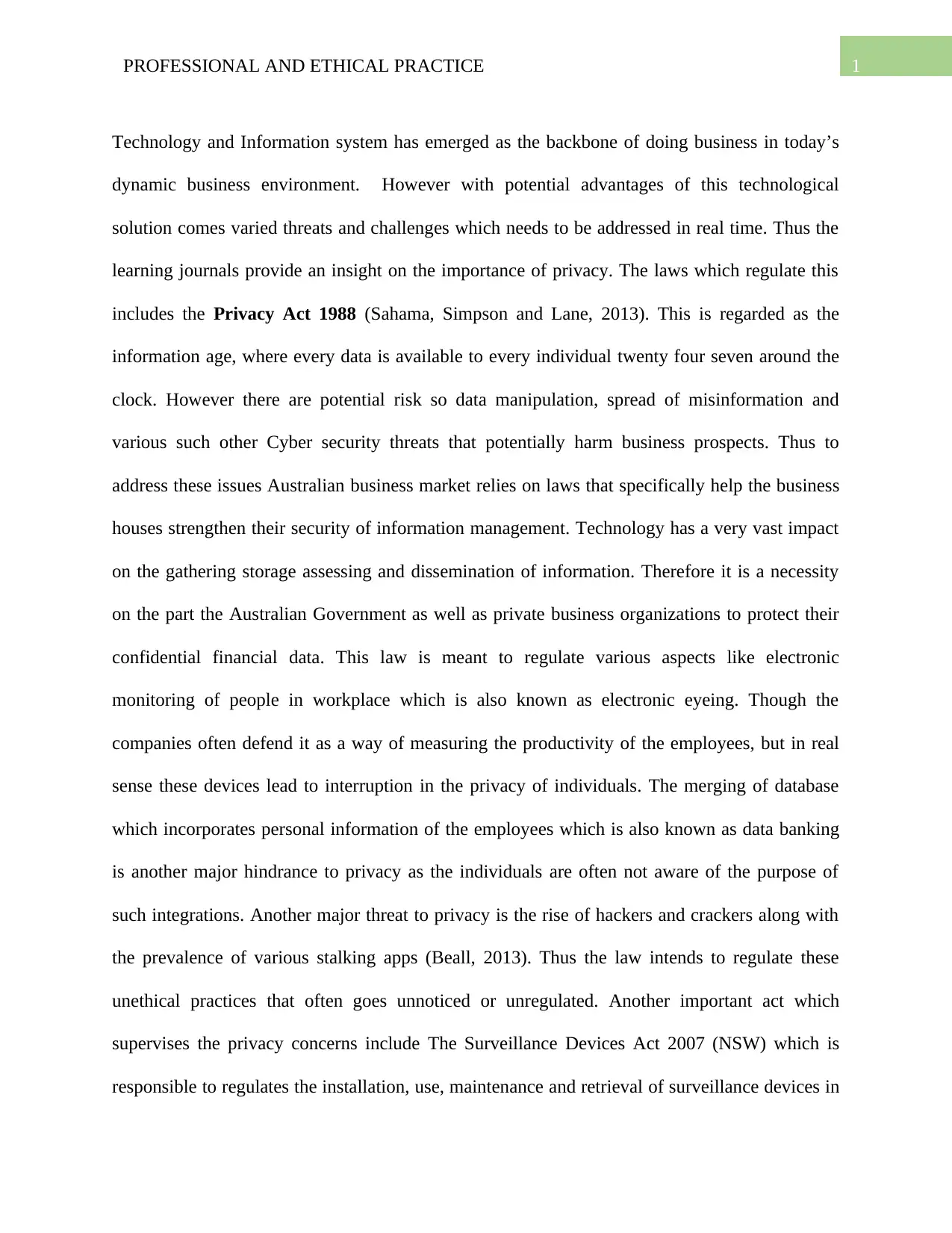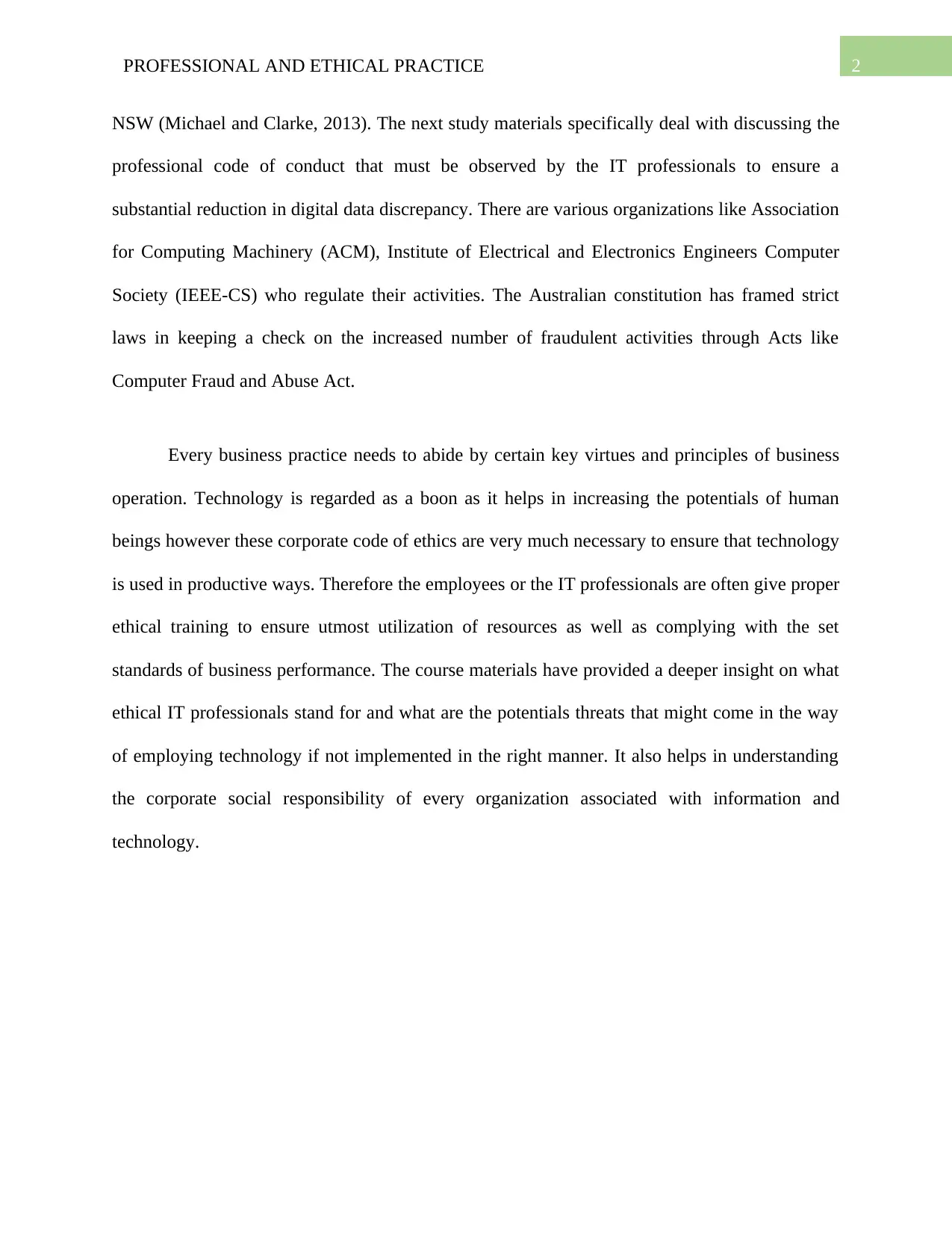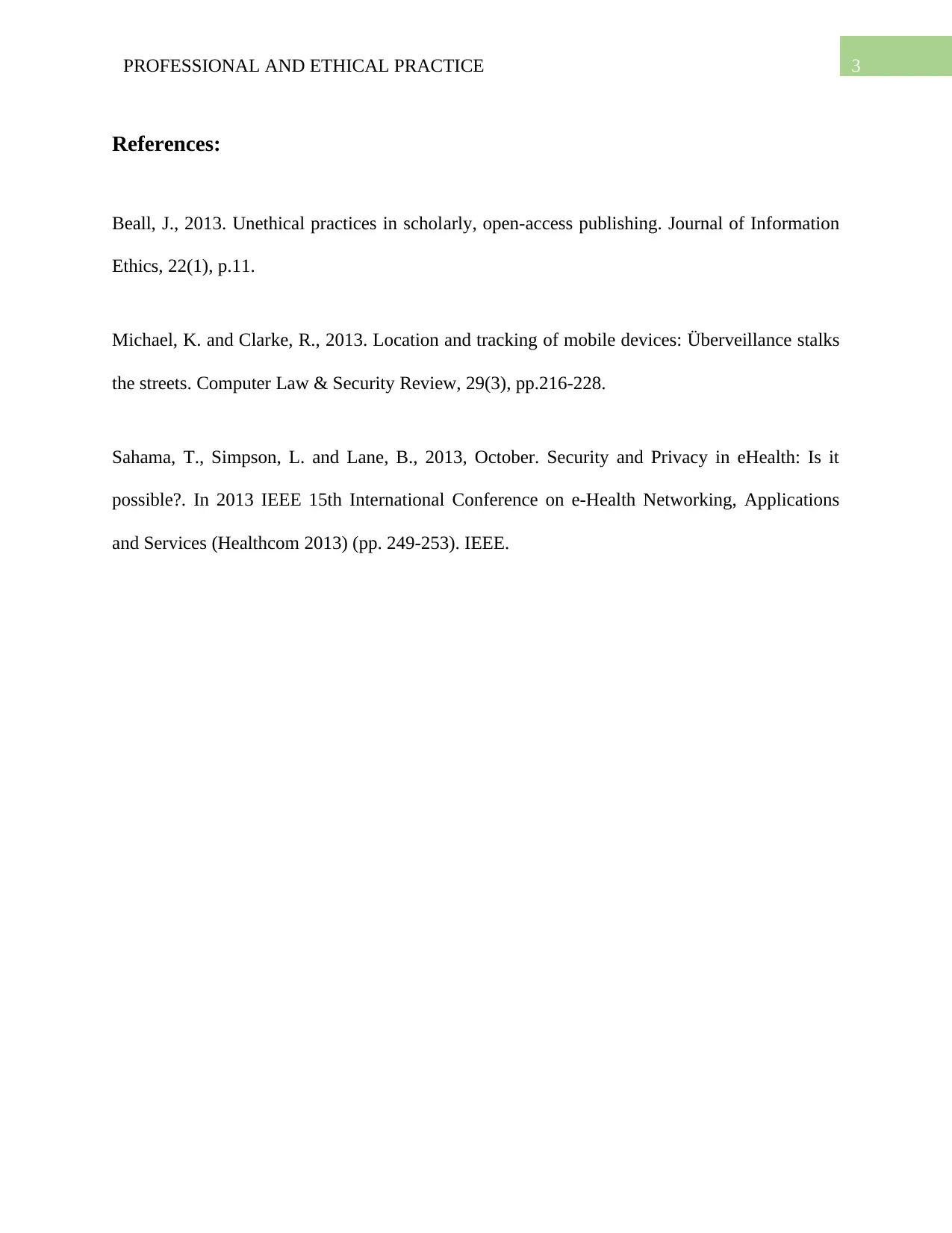University IT Ethics: Professional and Ethical Practice Journal
VerifiedAdded on 2022/09/18
|4
|739
|25
Journal and Reflective Writing
AI Summary
This reflective journal explores the crucial aspects of professional and ethical practice within the IT sector. It delves into the significance of privacy, referencing the Privacy Act 1988 and the Surveillance Devices Act 2007 (NSW), highlighting the need for data security in the face of cyber threats and data manipulation. The journal also examines the importance of professional codes of conduct, referencing organizations like ACM and IEEE-CS, and emphasizes the role of ethical training and corporate social responsibility in mitigating digital data discrepancies and ensuring the productive and ethical use of technology. The content reflects on the application of these principles and laws in the context of an IT professional's career.

Running Head: PROFESSIONAL AND ETHICAL PRACTICE
PROFESSIONAL AND ETHICAL PRACTICE
Name of the Student
Name of the University
Author’s Name
PROFESSIONAL AND ETHICAL PRACTICE
Name of the Student
Name of the University
Author’s Name
Paraphrase This Document
Need a fresh take? Get an instant paraphrase of this document with our AI Paraphraser

1PROFESSIONAL AND ETHICAL PRACTICE
Technology and Information system has emerged as the backbone of doing business in today’s
dynamic business environment. However with potential advantages of this technological
solution comes varied threats and challenges which needs to be addressed in real time. Thus the
learning journals provide an insight on the importance of privacy. The laws which regulate this
includes the Privacy Act 1988 (Sahama, Simpson and Lane, 2013). This is regarded as the
information age, where every data is available to every individual twenty four seven around the
clock. However there are potential risk so data manipulation, spread of misinformation and
various such other Cyber security threats that potentially harm business prospects. Thus to
address these issues Australian business market relies on laws that specifically help the business
houses strengthen their security of information management. Technology has a very vast impact
on the gathering storage assessing and dissemination of information. Therefore it is a necessity
on the part the Australian Government as well as private business organizations to protect their
confidential financial data. This law is meant to regulate various aspects like electronic
monitoring of people in workplace which is also known as electronic eyeing. Though the
companies often defend it as a way of measuring the productivity of the employees, but in real
sense these devices lead to interruption in the privacy of individuals. The merging of database
which incorporates personal information of the employees which is also known as data banking
is another major hindrance to privacy as the individuals are often not aware of the purpose of
such integrations. Another major threat to privacy is the rise of hackers and crackers along with
the prevalence of various stalking apps (Beall, 2013). Thus the law intends to regulate these
unethical practices that often goes unnoticed or unregulated. Another important act which
supervises the privacy concerns include The Surveillance Devices Act 2007 (NSW) which is
responsible to regulates the installation, use, maintenance and retrieval of surveillance devices in
Technology and Information system has emerged as the backbone of doing business in today’s
dynamic business environment. However with potential advantages of this technological
solution comes varied threats and challenges which needs to be addressed in real time. Thus the
learning journals provide an insight on the importance of privacy. The laws which regulate this
includes the Privacy Act 1988 (Sahama, Simpson and Lane, 2013). This is regarded as the
information age, where every data is available to every individual twenty four seven around the
clock. However there are potential risk so data manipulation, spread of misinformation and
various such other Cyber security threats that potentially harm business prospects. Thus to
address these issues Australian business market relies on laws that specifically help the business
houses strengthen their security of information management. Technology has a very vast impact
on the gathering storage assessing and dissemination of information. Therefore it is a necessity
on the part the Australian Government as well as private business organizations to protect their
confidential financial data. This law is meant to regulate various aspects like electronic
monitoring of people in workplace which is also known as electronic eyeing. Though the
companies often defend it as a way of measuring the productivity of the employees, but in real
sense these devices lead to interruption in the privacy of individuals. The merging of database
which incorporates personal information of the employees which is also known as data banking
is another major hindrance to privacy as the individuals are often not aware of the purpose of
such integrations. Another major threat to privacy is the rise of hackers and crackers along with
the prevalence of various stalking apps (Beall, 2013). Thus the law intends to regulate these
unethical practices that often goes unnoticed or unregulated. Another important act which
supervises the privacy concerns include The Surveillance Devices Act 2007 (NSW) which is
responsible to regulates the installation, use, maintenance and retrieval of surveillance devices in

2PROFESSIONAL AND ETHICAL PRACTICE
NSW (Michael and Clarke, 2013). The next study materials specifically deal with discussing the
professional code of conduct that must be observed by the IT professionals to ensure a
substantial reduction in digital data discrepancy. There are various organizations like Association
for Computing Machinery (ACM), Institute of Electrical and Electronics Engineers Computer
Society (IEEE-CS) who regulate their activities. The Australian constitution has framed strict
laws in keeping a check on the increased number of fraudulent activities through Acts like
Computer Fraud and Abuse Act.
Every business practice needs to abide by certain key virtues and principles of business
operation. Technology is regarded as a boon as it helps in increasing the potentials of human
beings however these corporate code of ethics are very much necessary to ensure that technology
is used in productive ways. Therefore the employees or the IT professionals are often give proper
ethical training to ensure utmost utilization of resources as well as complying with the set
standards of business performance. The course materials have provided a deeper insight on what
ethical IT professionals stand for and what are the potentials threats that might come in the way
of employing technology if not implemented in the right manner. It also helps in understanding
the corporate social responsibility of every organization associated with information and
technology.
NSW (Michael and Clarke, 2013). The next study materials specifically deal with discussing the
professional code of conduct that must be observed by the IT professionals to ensure a
substantial reduction in digital data discrepancy. There are various organizations like Association
for Computing Machinery (ACM), Institute of Electrical and Electronics Engineers Computer
Society (IEEE-CS) who regulate their activities. The Australian constitution has framed strict
laws in keeping a check on the increased number of fraudulent activities through Acts like
Computer Fraud and Abuse Act.
Every business practice needs to abide by certain key virtues and principles of business
operation. Technology is regarded as a boon as it helps in increasing the potentials of human
beings however these corporate code of ethics are very much necessary to ensure that technology
is used in productive ways. Therefore the employees or the IT professionals are often give proper
ethical training to ensure utmost utilization of resources as well as complying with the set
standards of business performance. The course materials have provided a deeper insight on what
ethical IT professionals stand for and what are the potentials threats that might come in the way
of employing technology if not implemented in the right manner. It also helps in understanding
the corporate social responsibility of every organization associated with information and
technology.
⊘ This is a preview!⊘
Do you want full access?
Subscribe today to unlock all pages.

Trusted by 1+ million students worldwide

3PROFESSIONAL AND ETHICAL PRACTICE
References:
Beall, J., 2013. Unethical practices in scholarly, open-access publishing. Journal of Information
Ethics, 22(1), p.11.
Michael, K. and Clarke, R., 2013. Location and tracking of mobile devices: Überveillance stalks
the streets. Computer Law & Security Review, 29(3), pp.216-228.
Sahama, T., Simpson, L. and Lane, B., 2013, October. Security and Privacy in eHealth: Is it
possible?. In 2013 IEEE 15th International Conference on e-Health Networking, Applications
and Services (Healthcom 2013) (pp. 249-253). IEEE.
References:
Beall, J., 2013. Unethical practices in scholarly, open-access publishing. Journal of Information
Ethics, 22(1), p.11.
Michael, K. and Clarke, R., 2013. Location and tracking of mobile devices: Überveillance stalks
the streets. Computer Law & Security Review, 29(3), pp.216-228.
Sahama, T., Simpson, L. and Lane, B., 2013, October. Security and Privacy in eHealth: Is it
possible?. In 2013 IEEE 15th International Conference on e-Health Networking, Applications
and Services (Healthcom 2013) (pp. 249-253). IEEE.
1 out of 4
Related Documents
Your All-in-One AI-Powered Toolkit for Academic Success.
+13062052269
info@desklib.com
Available 24*7 on WhatsApp / Email
![[object Object]](/_next/static/media/star-bottom.7253800d.svg)
Unlock your academic potential
Copyright © 2020–2026 A2Z Services. All Rights Reserved. Developed and managed by ZUCOL.





